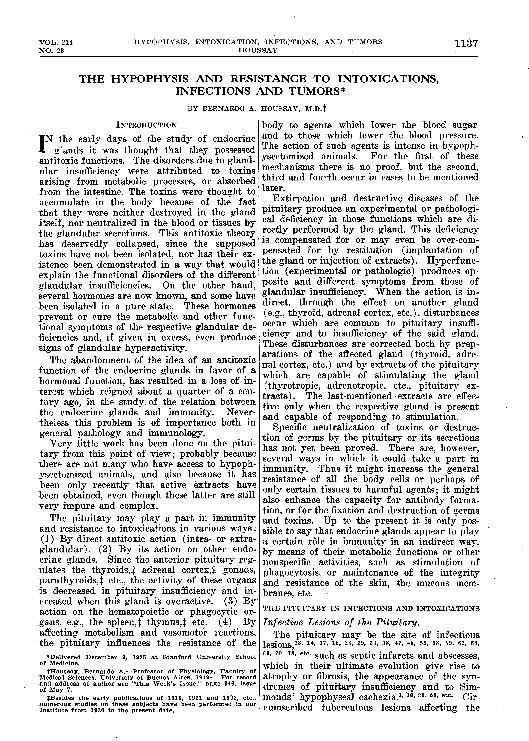Artículo
The hypophysis and resistance to intoxications, infections and tumors
Fecha de publicación:
04/06/1936
Editorial:
Massachusetts Medical Society
Revista:
New England Journal of Medicine
ISSN:
0028-4793
Idioma:
Inglés
Volumen:
214
Número:
23
Páginas:
0028-4793
Subtipo:
Artículo científico
Financiación:
Fundacion Williams.;
Fundación de Instituto de Biología y Medicina Experimental;
Consejo Nacional de Investigaciones Científicas y Técnicas;
Nombre del Proyecto:
Proyecto Houssay y Leloir
Clasificación temática:
Resumen
In the early days of the study of endocrine glands it was thought that they possessed antitoxic functions. The disorders due to glandular insufficiency were attributed to toxins arising from metabolic processes, or absorbed from the intestine. The toxins were thought to accumulate in the body because of the fact that they were neither destroyed in the gland itself, nor neutralized in the blood or tissues by the glandular secretions. This antitoxic theory has deservedly collapsed, since the supposed toxins have not been isolated, nor has their existence been demonstrated in a way that would explain the functional disorders of the different glandular insufficiencies. On the other hand, several hormones are now known, and some have been isolated in a pure state. These hormones prevent or cure the metabolic and other functional symptoms of the respective glandular deficiencies and, if given in excess, even produce signs of glandular hyperactivity.
Archivos asociados
Licencia
Identificadores
Colecciones
Recursos continuos (Bernardo Alberto Houssay)
Recursos continuos (Bernardo Alberto Houssay)
Recursos continuos (Bernardo Alberto Houssay)
Citación
Houssay, Bernardo Alberto; The hypophysis and resistance to intoxications, infections and tumors; Massachusetts Medical Society; New England Journal of Medicine; 214; 23; 4-6-1936; 0028-4793
Compartir
Altmétricas




